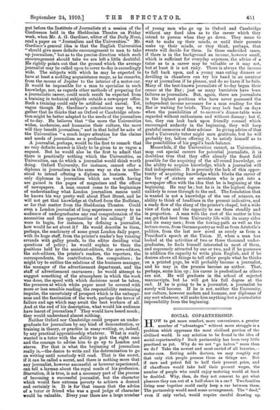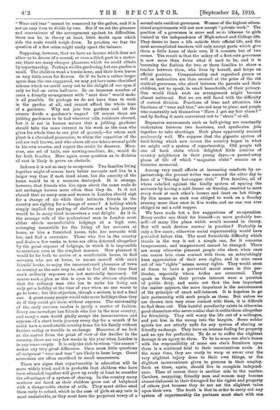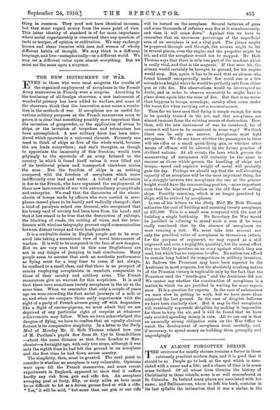SOCIAL COPARTNERSHIP. -H -OW to get more comfort, more convenience, a
greater number of " advantages " without more struggle is a problem which oppresses the most civilised portion of the civilised world. Is any solution to be found in the idea of social copartnership ? Such partnership has been very little practised as yet. Why do we not " go halves " more than we do P Take the newest and most envied of all luxuries,- motor-cars. Setting aside doctors, we may roughly say that only rich people possess them as things are. But if cars and petrol fell to half their present price, and if chauffeurs would take half their present wages, the number of people who could enjoy motoring would at least be doubled. Why, then, do they not consent to get what pleasure they can ont of a half-share in a car P Two families living near together could easily keep a car between them. The partnership would need some arrangement. The " deed," even if only verbal, would require careful drawing up. " Wear and tear " cannot be measured by the gallon, and it is not an easy item to divide by two. But if we set the pleasure and convenience of the arrangement against its difficulties. there can be, in theory at least, little doubt upon which side the scale would weigh down. In practice, we fear the question of a few coins might easily upset the balance.
Supposing, however, that we have an income which does not allow us to dream of a second, or even a third, part in a motor- car, there are many cheaper pleasures which we could obtain by copartnership. Perhaps we like gardening, but our garden is small. The children want a tennis-lawn, and their lawn leaves us very little room for flowers. Or if we have a rather larger space than the one suggested, we may yet have some cherished scheme which we could carry out to the delight of our eyes if only we had an extra half-acre. In an immense number of cases a friendly arrangement with " next door" would make it all possible. Or perhaps we do not have time to work in the garden at all, and cannot afford the whole time of a gardener. Why not join two gardens and let the owners divide a gardener's wages P Of course there are jobbing gardeners to be had wherever villa residents abound, but it is not in human nature that a jobbing gardener should take the same interest in his work as the man who gives his whole time to one plot of ground,—for whom each plant is a cherished possession, to whom the capacities of the soil are well known, and who above all can take a normal pride in his own success, and expect the credit he deserves. More- over, one set of tools, one mowing-machine, &c., would do for both families. Here again some question as to division of cost is likely to prove an obstacle.
Indoors it is not so easy to co-operate. Two families living together might of course have better servants and live in a larger way than if each lived alone, but the amenity of the home would be in a measure destroyed. It is strange, however, that friends who live upon about the same scale do not exchange houses more often than they do. Is it not absurd that so many men and women in London should sigh for a change of air while their intimate friends in the country are sighing for a change of scene P A holiday which simply implied the packing of clothes and a train journey would be to many tired housewives a real delight. As it is, the average wife of the professional man in London must either obtain uncomfortable lodgings at a high rate, arranging meanwhile for the living of her servants at home, or hire a furnished house, take her servants with her, and find a caretaker. Those who live in the country and desire a few weeks in town are often deterred altogether by the great expense of lodgings, in which it is impossible to entertain even in the simplest manner. How pleasant it would be for both to arrive at a comfortable house, to find servants who are at home, to amuse oneself with one's friends' books, to enjoy the unaccustomed pleasures of town or country as the case may be, and to feel all the time that one's ordinary expenses are not materially increased. Of course such a plan as this is open to the obvious objection that the ordinary man who has to make his living can only get a holiday at the time of year when no one wants to go to town ; but this objection, though a serious, is not a final one. A great many people would take more holidays than they do if they could get them without expense. The universality of the early autumn exodus is partly a matter of fashion. Every one nowadays has friends who live in the near country, and many a man would gladly accept the inconvenience and expense of a short train journey every day for a month if he could have a comfortable country home for his family without further outlay or trouble in exchange. Moreover, if we look at the matter from the point of view of the dweller in the country, there are very few weeks in the year when London is in any sense empty. It is only the rich to whom "the season" makes any very great difference. Once more little questions of reciprocal " wear and tear" are likely to loom large. Great economies are often sacrificed to small meannesses.
There are signs that copartnership in education will be more widely tried, and it is probable that children who have been educated together will grow up ready at least to consider the advantages of a system of sharing. In the country many mothers are faced as their children grow out of babyhood with a disagreeable choice of evils. They must either send them early to school, which in the case of girls at any rate is most undesirable, or they must have the perpetual worry of a second-rate resident governess. Women of the highest educa- tional acquirements will not now accept " private work." The position of a governess is more and mere irksome to girls trained in the independence of High-school and College life. They desire to have a life outside their official life, and the most accomplished teachers will only accept posts which give them a little home of their own, if it consists but of two rooms. The result is that the salary of a first-rate governess is now more than twice what it used to be, and it is becoming the fashion for two or three families to share a teacher between them, who lives by herself, and keeps an official position. Companionship and organised games as well as instruction are thus secured at the price of the old resident governess, who stood between the parents and their children, not to speak, in small households, of their privacy. One would think such an arrangement might become almost universal. But we are still faced with the difficulty of correct division. Fractions of time and attention, like fractions of "wear and tear," are not easy to piece, and people who constantly ask themselves " Have I got my fair share P " end by finding it more convenient not to " share" at all.
Expensive amusements such as ball-giving are constantly undertaken between two hostesses, and syndicates join together to take shootings. Both plans apparently succeed moderately well. We suppose that the gigantic system of book-hiring which now covers the country began in what we might call a system of copartnership. Old people tell one of book clubs which delighted little coteries of country neighbours in their young days,—a passed-away phase of life of which " magazine clubs " remain as a tiresome memorial.
Among very small efforts at increasing comforts by co- partnership, the present writer was amused the other day to hear of a "Sunday hot-supper club." Five families, all of whom rebelled against the kindly system of sparing the servants by having a cold dinner on Sunday, resolved to meet every week at each other's houses and feast on hot things. By this means no cook was obliged to work on a Sunday evening more than once in five weeks, and no one was ever obliged to eat a cold supper.
We have made but a few suggestions of co-operation. Every reader can think for himself—or more probably her- self—of many like plans which would succeed in theory. But will such devices answer in practice P Probably in only a few cases ; otherwise social copartnership would have prevailed before this. The most formidable difficulty which stands in the way is not a simple one, for it concerns temperament, and temperament cannot be changed. There are many otherwise pleasant people who show, when once one comes into close contact with them, an astonishingly keen appreciation of their own rights, and in nine cases out of ten " rights " means money rights. They would seem at times to have a perverted moral sense in this par- ticular, especially where trifles are concerned. They speak as though their private interest were a question of public duty, and make out that the less important the matter appears, the more important is the maintenance of the principle of exact self-interest. It is hopeless to go into partnership with such people as these. But unless we are thrown into very close contact with them, it is difficult to find them out. This hateful peculiarity exists in otherwise good characters who never realise that it unfits them altogether for friendship. They will worry the life out of a colleague, and put him in the wrong into the bargain. Some nobler spirits too are utterly unfit for any system of sharing or friendly exchange. They have an intense feeling for property and an eye for perfection. To do or to suffer the slightest damage is an agony to them. To be in some one else's house with the responsibility of some one else's furniture upon them is a continual trial to their conscientious souls. At the same time, they are ready to weep or swear over the very slightest injury done to their own things, or the slightest inconvenience given to persons in their employ. Such as these, again, should live in complete independ- ence. Then of course there is another side to the matter. Careless, easygoing, friendly men and women may become almost dishonest in their disregard for the rights and property of others just because they do not set the slightest value upon their own. The truth is that in order to carry out any system of copartnership the partners must start with one
thing in common. They need not have identical incomes, but they must regard money from the same point of view. This latter identity of standard is of far more importance where social copartnership is concerned than any question of taste or temper, of opinion or cultivation. We may exchange houses and share luxuries with men and women of wholly different habits of thought. We may think in a different language, and live—metaphorically—in a different world. We may set a different value upon almost everything. But we must set the same upon a sixpence.












































 Previous page
Previous page